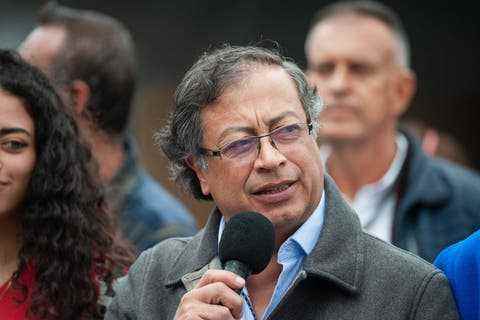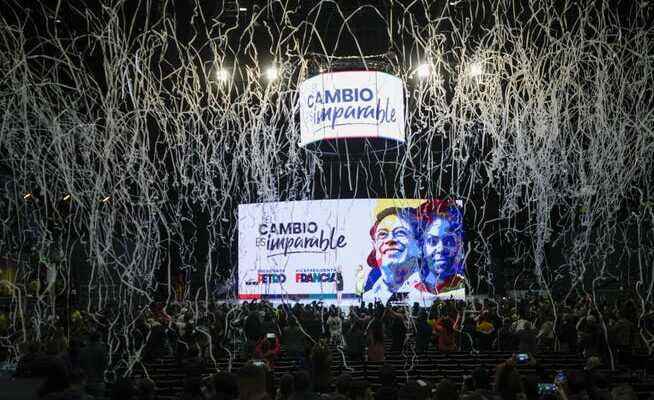After a head-to-head race in the election campaign, Gustavo Petro was able to win the presidential election in Colombia by a clear margin against the construction magnate Rodolfo Hernández. Violent incidents had occurred beforehand.
Confetti explodes on election night at the headquarters of newly elected President Gustavo Petro (left) and his running mate Francia Márquez in Bogotá.
(dpa/Reuters)
The Colombians have elected a new president: the former guerrilla fighter Gustavo Petro won the runoff against the multi-million dollar real estate entrepreneur Rodolfo Hernández. Petro, who has promised deep social and economic changes, became the first progressive in Colombia’s history to win the presidential election on Sunday.
Petro, a former member of the M-19 guerrilla movement, defeated construction magnate Hernández by an unexpectedly large margin of around 700,000 votes. Although Petro was long considered a favorite, the previously largely unknown Hernández drew level in the polls. Petro won by 50.5 percent versus Hernández’s 47.3 percent of the vote, according to preliminary results.

Gustavo Petro on June 19 in Bogotá.
“Today is a day of joy for the people,” Petro wrote on Twitter after the polls closed. «This is a victory for God and for people and their history. Today is Streets and Squares Day.” Petro, a former mayor of the capital Bogotá and now a senator, has promised to fight inequality with free higher education, pension reforms and heavy taxes on unproductive land.
“I called Gustavo Petro to congratulate him as the elected President of the Colombian people,” President Iván Duque wrote on Twitter. “We have agreed to meet in the next few days to initiate a smooth, institutional and transparent transition.”
The defeated candidate also admitted defeat. “The majority of citizens who voted today voted for the other candidate,” Hernández said in a video message. «I accept the result». Hernández wanted to take action against corruption, although he himself is under investigation for corruption. The 77-year-old former mayor of the city of Bucaramanga recently made a name for himself with his videos on Tiktok and his attacks on foreigners, women and political opponents.
This is the first time in recent Colombian history that an avowed leftist has moved into the presidential palace in Bogotá. The South American country is traditionally conservative. The social divide is great, but left-wing politics has had a bad reputation so far due to the violence of guerrilla groups in decades of armed conflict.
At Petro’s side, Vice-President-elect Francia Márquez, an Afro-Colombian human rights activist and environmentalist, will take over as head of state. She fought against illegal gold prospecting in the Cauca region, which was particularly hard hit by the violence, and was threatened several times. In 2018, she received the prestigious Goldman award for her fight.
violent incidents
By the time the polling stations closed on Sunday, there had been a few incidents in the former civil war country. In San Vicente del Caguán, a soldier was killed in an attack by a splinter group of the guerrilla organization FARC, as reported by the newspaper “El Tiempo”. A poll worker was shot dead in Cauca Department. A total of 104 irregularities were reported, according to independent election observers.
The security forces arrested a total of nine suspects in different regions of the South American country, including a leader of the rebel group ELN and a supporter of the FARC dissidents. Over 300,000 police officers and soldiers were deployed to protect voters, poll workers and candidates.
The challenges for the future head of state are great: The second most populous country in South America with around 50 million inhabitants is suffering from the economic consequences of the corona pandemic, great social injustice and violence. The incumbent conservative government only implemented the peace agreement with the FARC rebels half-heartedly.
Petro wants to pacify the country, slow down the exploitation of raw materials, promote tourism and tax companies more heavily. This could also have consequences for Germany, which wants to import more coal from Colombia in the future because of the sanctions against Russia because of the war of aggression against Ukraine. However, coal imports from Colombia are very controversial – critics speak of “bloody coal”. For example, activists have complained about a series of human rights violations and environmental crimes around Colombia’s largest coal mine, El Cerrejón, in the north-east of the country.
